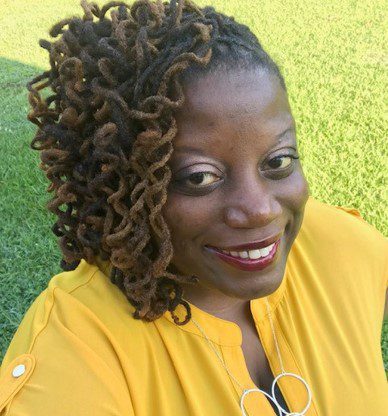Why I Teach: Sabrina Clark

Welcome to “Why I Teach.” Here we’ll highlight the contributions of the UNC Charlotte College of Health and Human Services instructors who bring their knowledge and expertise from the professional world to the classroom.
“Our adjunct instructors are well-positioned in their companies and our community and represent a broad spectrum of highly experienced content experts, entrepreneurs, leaders and mentors. They’re able to provide real world and real time examples to convey concepts by drawing from their accrued workplace experiences. They also represent an instant networking experience for our students simply by sharing their connections, identifying opportunities and providing critically important reference letters. That they choose to work as adjunct instructors above and beyond their commitments to their day jobs speaks to their dedication to preparing the next generation to follow in their own successful footsteps.” –Dean Catrine Tudor-Locke
Sabrina Clark, LAPSW, CSWM
What I teach
I most frequently teach a variety of macro social work courses for BSW and MSW students centered around such topics as ethics, diversity, advocacy, policy, and advanced practice within organizations. I also facilitate external supervision groups for students in field placements without a social worker on staff.
Academic Unit
School of Social Work
My goals
My overarching goal is to leverage course content, research, and my lived experience in a manner that provides an optimal environment where students feel seen, supported, and empowered to achieve—and exceed—their learning goals.
Years of experience
I’ve been a social worker for over 21 years and am in my 3rd year of serving as an adjunct faculty member.
Why do you teach?
I teach because I firmly believe that the individuals, families, and communities served by the social work profession deserve the best possible service delivery, backed by the best available knowledge. Our educational experiences play a pivotal role in the type of practitioners that we will become and leveraging my experience to support the next generation of practitioners is important to me.
Do you have a particularly memorable moment from the classroom?
One particularly memorable moment occurred on a day that I was running a few minutes late for an evening class due to traffic resulting from inclement weather. While I wasn’t actually late—just later than what the students knew to be my normal arrival time—the class greeted me with expressions of concern upon my arrival and indicated that they were glad I was there. Having completed my own undergraduate studies at a time when the 10 and 15-minute rules reigned supreme. I was struck in that moment by the students’ level of investment in the course. As a professor teaching her first in-person class, that moment spoke volumes to me regarding their level of connection to the content and our shared environment and is one that I’ve not forgotten.
What’s your best piece of advice for students both in college and after graduation?
One of the best pieces of professional advice that I’ve received throughout my career came from the keynote speaker at my own MSW commencement ceremony: “Find your place between the sun and moon so that you may always land among the stars.” I first heard those words almost 13 years ago—yet they’ve remained with me, have become the standard that I strive for in all that I do, and is the best, most comprehensive advice that I would offer students and emerging practitioners.
What skills are most valuable for new graduates?
So many to name here! A few key skills though that I believe new graduates should keep in their pocket are adaptability, dependability, engagement, advocacy, critical thinking, negotiation, and STRONG written and verbal communication.
Where do you see professionals early in their careers challenged the most in your field?
In addition to just generally acclimating to the culture, climate, and expectations associated with their new role, I’ve observed new practitioners to be challenged by balancing a need to establish their credibility with owning what they don’t yet know. I believe that keeping a sense of humility and commitment to ongoing development central to their professional identity, as well as giving themselves grace throughout their learning curves, can help.
What do you see as a few of the most important topics in the health and human services fields over the next 10 years?
While our fields will continue to face many key issues, I believe that they can largely be captured under one umbrella: trauma-informed care. Regardless of the setting or role that we occupy, health and human services practitioners are increasingly called upon to meet the needs of individuals, families, and communities impacted by some form of chronic stress or trauma. Thus, I believe that many issues facing our profession and those we serve can be addressed by continuously enhancing our capacity for providing trauma-informed care.
What’s most rewarding about serving as an adjunct instructor?
Seeing students grow personally and professionally through our interactions is hands down the most rewarding part of adjunct work.
Favorite part of your job?
In my full-time role as the Policy Practice Model Supervisor for Mecklenburg County DSS-Youth Family Services Division, I have the privilege and honor of designing programs and practices that directly impact our county’s child welfare service delivery, leading a team of child welfare practice coaches, and positively contributing to the professional development needs of our workforce. Honestly, I love it all.
Why teach at UNC Charlotte?
Our mission at the School of Social Work is to prepare future social work professionals for leadership in areas of culturally-informed, community-engaged practice, policy, and research. That aligns with my own. I enjoy paying it forward—personally, professionally, and civically—and enjoy being able to do so with students through my work here.
* Offered in support of the School of Social Work’s mission statement, which is responsive to the Council on Social Work Education (CSWE)’s accreditation requirements.